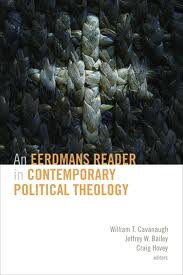William T. Cavanaugh, Jeffrey W. Bailey, and Craig Hovey, Editors, An Eerdmans Reader in Contemporary Political Theology. Eerdmans, 2011.
Referenced in: Christian Perspectives on Politics and Church-State
LifeandLeadership.com Summary
For many in the missional and emergent conversations today, the relationship of Christianity and politics is a major concern. This perspective is not shared by all. For those who come from a tradition of non-involvement, someone needs to make the case for engagement. At over 800 pages, this text is an exhaustive introductory guide. The articles are weighty and technical. Readers may need more elementary introduction before diving in.
The special value of this text is the editors approach the subject partly as academics, providing an introduction for students who are encountering the topic for the first time. They put central texts in one place, following this thematic arrangement:
- Reading the Bible politically
- Liturgy and politics
- Kingdom come
- America and the church
- In the shadow of Auschwitz
- Confronting the powers
- Gender and race
- Postcolonial challenges
- Church-based politics
- Christendom reconsidered
- After 9/11
Also, they arrange the essays so as to capture each author’s broader theological vision of the “political arrangement of human communities” based on perceptions of the nature of God, humanity, the goal of history, the relationship between divine and human authority, etc. Indeed there is the question as to “whether politics could exist without a theological vision,” (xxi) because “when theology is banished from the public realm, it simply reasserts itself in other guises.” (xxii) The authors contend that conversations about God are increasing in the public square. Often, the talk is couched as “politics,” but the authors contend that debates about faith in public life, if they are to be conversations of any substance, are debates about theology.
To engage in such debates…requires that one become theologically literate and develop the knowledge and skills to enter into a conversation that has been taking place across a diversity of contexts for generations. This volume aims to contribute to that conversation by bringing together some of its most important voices from the recent past, with selections of writing that capture central trajectories of thought.” (xviii)
This volume makes a good contribution in introducing political theology, alongside works such as the Blackwell Companion to Political Theology, and others listed in the guide on Christian Political Theory. They go beyond the “Western” canon of contemporary political theology to include voices from Africa, Asia, Latin America, and elsewhere.
From the Publisher
The signficance of theology for politics and the common good – central to public debatee throughout history – has especially come to the fore again. This volume places such matters as church and state, race, gender, power, reading the Bible politically, and postcolonial challenges withi the context of the explosion of poltical theology over the last one hundred years.
An Eerdmans Reader in Contemporary Political Theology gathers forty-nine essential readings in global political theology from the twentieth and twenty-first centuries, including many selections from the Two-Thirds World.
Carefully selected, thematically arranged, and expertly introduced, these forty-nine essential readings constitute an ideal primary-source introduction to contemporary political theology — a profoundly relevant resource for globally engaged citizens, students, and scholars.
CONTRIBUTORS:
Nicholas Adams
Rafael Avila
Karl Barth
Richard Bauckham
Dietrich Bonhoeffer
Walter Brueggemann
Ernesto Cardenal
J. Kameron Carter
James H. Cone
Dorothy Day
Musa W. Dube
Jean Bethke Elshtain
Eric Gregory
Gustavo Gutiirrez
Stanley Hauerwas
George Hunsinger
Ada Marma Isasi-Diaz
Emmanuel M. Katongole
Rafiq Khoury
Kosuke Koyama
Brian McDonald
Johann Baptist Metzv Virgil Michel
Nistor O. Miguez
John Milbank
John Courtney Murray
Ched Myers
H. Richard Niebuhr
Reinhold Niebuhr
Arvind P. Nirmal
Oliver O’Donovan
Catherine Pickstock
Kwok Pui-lan
A. Maria Arul Raja
Walter Rauschenbusch
Joerg Rieger
Christopher Rowland
Rosemary Radford Ruether
Alexander Schmemann
Carl Schmitt
Peter Manley Scott
Jon Sobrino
Dorothee Solle
R. S. Sugirtharajah
Elsa Tamez
Mark Lewis Taylor
Emilie M. Townes
Desmond Tutu
Bernd Wannenwetsch
Graham Ward
George Weigel
Delores S. Williams
Rowan Williams
Walter Wink
John Howard Yoder
Kim Yong-Bock
About the Authors
William T. Cavanaugh is senior research professor at the Center for World Catholicism and Intercultural Theology and professor of Catholic studies at DePaul University. His other books include The Myth of Religious Violence: Secular Ideology and the Roots of Modern Conflict and Migrations of the Holy: God, State, and the Political Meaning of the Church.
Jeffrey W. Bailey is deputy director at the Centre for Social Justice, London, and an affiliated lecturer at the University of Cambridge.
Craig Hovey is assistant professor of religion at Ashland University, Ashland, Ohio, and the author of Bearing True Witness: Truthfulness in Christian Practice.


